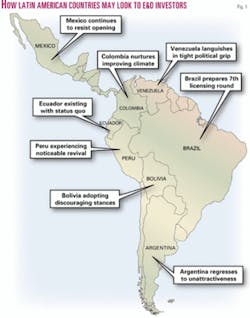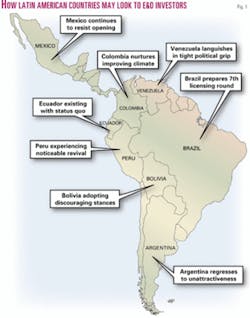Political struggles overshadowing Latin America's risk attractiveness
A look at recent history and current developments in certain countries of Latin America gives an uneven prospect on the implementation of privatization and deregulation, industry growth in state-controlled countries, and what is being done to encourage exploration.
The oil and gas investment climate in Latin America is mostly determined by government policies that regulate the industry and create either a restrictive or an open investment scenario. This climate is heavily influenced by local politics and, to a lesser extent, by global economic trends.
Halt in Argentina
After significant growth in exploration and production activities in the 1990s, things have come almost to a screeching halt.
The privatization of YPF in the early 1990s and the full opening of the upstream and downstream industries to private sector participation and competition attracted billions of dollars in investment in exploration, development, and infrastructure.
This activity was fueled by both domestic demand growth and demand for exports of electricity and natural gas. However, since the 2001-02 currency devaluation and subsequent conversion of domestic receivables to devalued pesos, plus domestic tariff freezes on electricity and natural gas, new exploration activities and investment have been reduced almost to zero.
In order to force domestic producers to continue supplying the domestic market, the government has limited and taxed exports of gas to Chile. For a foreign company looking at how best to allocate its exploration dollars, Argentina has fallen near the bottom. Current regulated prices and market restrictions do not compensate risk and invested capital.
As a direct consequence of such government action, Argentina now is importing electricity from Brazil after having been an exporter and, in addition to restricting gas exports to Chile, Argentina now is having to import gas from Bolivia to make up for shortfalls in domestic production.
Because companies are naturally not investing in exploration and infrastructure, the government has decided to create a new state-owned energy company, Enarsa, to somehow channel scarce public funds and make up the investment void left by the private sector.
The electric industry, which represents the single largest demand for gas, is being strong-armed to agree to invest capital to add generation capacity as part of the process to gradually increase electric tariffs.
In terms of investment climate, the Argentina of the 1990s is today a distant memory. The high GDP growth numbers for 2003 and 2004 look good only if one ignores the 2000-02 depression. For the near term at least, there is nothing in terms of policy or market regulation that augurs a better investment environment for the oil and gas industry in Argentina.
Unstable Bolivia
The abrupt ending in the fall of 2003 of Pres. Gonzalo Sanchez de Losada’s second term in office was just one of the more visible symptoms of the very serious political instability existing in Bolivia today. This is having a profound effect on the oil and gas industry.
In the mid 1990s, Bolivia privatized the E&P and transportation businesses of YPFB and enacted a new hydrocarbon law and regulatory framework that did in fact attract billions in new exploration, production, and infrastructure investment. Under such legal regime, the country added trillions of cubic feet of discovered gas reserves, and a group of companies planned an LNG export project. Things are taking a turn now.
Bolivia has natural gas in abundance. The export of pipeline gas to Brazil that started in the late 1990s is not creating the bonanza that some expected because, in part, long-term wellhead prices were set reflecting the low prices at the time. Moreover, Petrobras is barely keeping up with taking minimum contracted volumes.
In light of the very limited domestic demand, the additional export of gas in the form of LNG to higher-paying markets made perfect sense. This project envisioned piping the gas through northern Chile in order to be liquefied and loaded onto ocean-going vessels.
There is a very strong political current in Bolivia that is opposed to the energy reforms carried out in the 1990s. There are a variety of reasons for this, but they include impatience with the materialization of the benefits at the consumer level that the government promised originally, as well as disagreement on the administration and redistribution of governmental oil and gas revenues.
Pres. Sanchez de Losada supported the LNG project, but because it involved crossing an area that now landlocked Bolivia lost to Chile in a war in the 1870s, the political opposition used such support as a rallying cause to oust him. Many Bolivians still hope to regain sovereign access to the sea, and having to negotiate a right-of-way with Chile over former Bolivian land is too much to stomach for some.
Consequently, the gas will remain in the ground for the foreseeable future. In the meantime, Pres. Carlos Mesa is in the middle of a highwire balancing act. With no strong support in Congress and with his own political survival at stake, he is giving in to the antireformists, and some say too much.
He sent a bill to Congress last year that would introduce a series of amendments to the hydrocarbon law and fiscal regime put in place in the mid 1990s. That bill now seems to have acquired a life of its own, rotating from committee to committee in the Congress, as the president seems to have lost control of its stewardship.
The result is almost certain to be new legislation that would reinstate state ownership at the wellhead of hydrocarbons produced by the private sector, return YPFB to the E&P business, and substantially increase the combined tax and royalty take to at least 50% of output.
The new legislation also would squarely aim at giving the state control over the domestic and international marketing of production (including setting domestic consumption and gas industrialization as priorities) and for the use of gas as a strategic political tool to regain territorial access to the sea. Controversially still, the new law would not grandfather existing contracts.
In sum, Bolivia is headed towards undoing reform and squeezing the oil companies-not very encouraging for the industry. The feeling in La Paz is that the oil companies are to fund the government’s domestic energy policies and its overriding foreign policy objective. Many new potential entrants (most notably Chinese oil company Shengli Oilfield International Exploit) have put their plans on hold pending clarity on the upcoming legislative provisions.
Reasonable Brazil
Brazil continues on the course charted at the time of the energy reforms in the late 1990s.
The Petrobras monopoly over the industry was broken up via a constitutional amendment in 1995, and by 1997 Brazil put in place regulatory bodies and agencies to govern the activities of foreign and Brazilian E&P companies, Petrobras included.
The government announced late last year that it will conduct its seventh round of lease sales in October 2005. The blocks to be made available for this round are expected to attract diverse interest and different sized companies.
The country is getting close to becoming self-sufficient in crude oil, and there is a keen interest in developing a strong gas industry. Due to its size, it is possible to think of Brazil as both an importer and an exporter of natural gas. There also is persistent talk of the possibility of an LNG export project based on gas reserves discovered off Rio de Janeiro State.
Socialist Pres. Lula has maintained the fundamental macroeconomic reforms and free market policies initiated by his predecessor, Fernando Henrique Cardoso. Adept monetary policy is also supporting strong domestic growth.
This is remarkable if one considers the reversals in Argentina and Bolivia, the false starts in Ecuador, and the “third way” in Venezuela. This bodes well for the oil and gas industry, which should continue seeing opportunities in Brazil within a reasonable regulatory framework.
To be sure, strong political differences still persist in Brazil at a level that does not ensure yet the sort of fundamental policy continuity that has served Chile so well. There are still nationalistic currents that would rather not see so many foreign oil companies operating in Brazil and populist politicians that would undo the fruits of painful fiscal discipline.
The sixth round of lease sales last year withstood various attempts to be derailed by labor, environmental, and nationalistic groups. Still, Pres. Lula is managing all these conflicting interests adeptly, and no major bumps in the road are foreseen.
Emerging Colombia
Colombia is benefiting from improved internal security, legal stability, and a growing local economy.
In 2003, Pres. Uribe had the initiative of breaking Ecopetrol into three pieces. Now separate agencies grant the oil and gas licenses and regulate the industry. These functions were carved out of Ecopetrol, which is now an oil company in the traditional commercial sense.
Private sector companies now obtain licenses directly from a government agency (the Agencia Nacional de Hidrocarburos-ANH) under a tax and royalty regime. There is no longer a mandatory association with Ecopetrol.
The ANH, in turn, has formulated important promotional changes to the fiscal regime and other terms and conditions. With Colombia’s terms being among the most competitive in South America, almost two dozen new E&P licenses were signed in 2004.
The companies signing these new contracts included ExxonMobil, Repsol YPF, and Petrobras. Most of the remaining contracts have been awarded to small independent companies, which will probably aim at assembling prospect portfolios to eventually sell to the majors.
Colombia’s oil reserves, production, and exports have been declining for years, and the government is determined to arrest this trend before the country becomes a net oil importer.
New policies in dealing with the guerrillas are resulting in fewer reported attacks to production and transportation facilities. The kidnapping count is also down. As a whole, the investment climate for oil and gas companies in Colombia is better now than it has been in recent memory.
Static Ecuador
Ecuador hasn’t experienced much change.
Successive attempts at reforming the role of Petroecuador, simplifying the process to award E&P contracts, and improving the terms and conditions of oil contracts have been routinely blocked and boycotted.
Nationalist and populist politicians, indigenous groups, the military, environmentalists, labor unions, and other interest groups have one way or another kept E&P operations in Ecuador well below consensus potential. The turnover at the helm of the national oil company and the Ministry of Energy is easily the highest in Latin America.
Improved terms and conditions and a better overall investment climate are key for the continuity of the oil industry as the recipient of the largest share of foreign investment and a substantial generator of public revenues.
The need for a better investment climate includes political stability (two presidents in the last 8 years did not end their terms at the constitutionally appointed time), clear policies for the industry that stick, and legal stability and predictability. Those conditions are not there yet, and as a result Ecuador is not competitive with its neighbors.
Stalled Mexico
Pres. Fox has tried every way he could, but the congress would have none of it.
Oil and gas E&P will remain a state monopoly in the hands of Pemex for the foreseeable future. It will continue being illegal for private companies to risk investment capital in the oil and gas business in Mexico.
All this happens in the face of declining oil reserves, soon-to-occur declining oil production and export revenues, inadequate capital investment in infrastructure, and continued increase in domestic demand for gas and oil products.
The multiple service contracts (MSCs) for the exploration, development, and production of nonassociated gas reserves of the Burgos basin in northeastern Mexico was the best the Fox administration could do in the face of current law. As their name indicates, these are service contracts with the private company having no upside or revenue as a function of production or commodity prices.
The company’s revenue comes from preagreed fees for unit of work completed. But there is downside: The company receives its fees only if there is enough increased production that is sold by Pemex in exchange for funds that are sufficient to cover the fees. Production under the MSC regime is not going to bridge the gap between gas demand and production in Mexico, not by a long shot.
Mexico’s energy policy of not amending its constitution and certain laws to allow for private-sector participation in the industry will solidify its position as a gas importer for the foreseeable future, thus presenting opportunities for investment in LNG regasification terminals and the sale and marketing of imported gas.
US and other exporters of refined products will also benefit because Mexico is set to maintain its status as exporter of crude oil and importer of refined products.
Reviving Peru
Pres. Toledo’s approval rating may indeed be in the single digits, but it has to be said that Peru has not changed its energy policy since the privatization of Petroperu and the passage of the hydrocarbon law of 1993.
Furthermore, in the past few years the government has made a genuine effort to improve the terms and conditions offered to oil companies and provide incentives to investment. These include alternative methods for calculating royalties, free sharing of technical information, reimbursement of sales taxes incurred during the exploration period, accelerated bidding procedures, etc. The result has been a noticeable revival of interest in upstream activities.
The arrival of Camisea gas to Lima in August 2004 was a historic event for Peru because, if anything else, changing governments did not waiver on policy and showed that Peru can attract large, long-term investment in the face of sharp opposition from various interest groups.
There is nothing in the current political discourse in Peru, or prevailing political conditions, that would lead one to fear the real possibility of policy changes adversely affecting the oil and gas industry in Peru. That is a welcome sign.
Political Venezuela
Since Pres. Hugo Chavez first took office in December 1998, several energy policy changes have taken place in Venezuela.
These include the passage of the 1999 law governing natural gas, the 2001 law governing crude oil, and the management and role of PDVSA. In a nutshell, the terms and conditions for exploration and production of nonassociated gas are fairly standard (bid process and reasonable tax and royalty), private sector participation is welcome, and association with PDVSA is not required.
The terms and conditions for investment in crude oil projects since 2001 are significantly restrictive, requiring mandatory joint ventures with PDVSA where PDVSA must have more than 50% participating interest.
Participation of private sector companies in oil projects without PDVSA’s control requires, literally, an act of Congress. One could reasonably conclude that new private sector participation in oil projects is of no high priority to the government. All mid and downstream activities were and remain firmly under state control.
PDVSA has now added the role of instrument for social and foreign policy. Its chief executive is now the same person as the minister of energy, thus putting PDVSA under the full political control of the government.
Acknowledgment
Alexandra Blanton, a paralegal in the global transactions group at King & Spalding LLP, also contributed to this article. ✦
The Author
Jose Valera ([email protected]) is a partner in the global transactions group in the Houston office of King & Spalding LLP. His practice includes respresenting oil and gas companies throughout Latin America. He has a JD from the Catholic University of Peru and a JD from South Texas College of Law.


